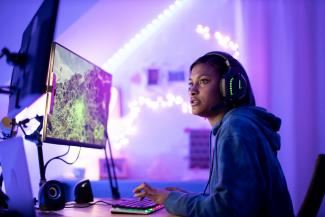
Instructions
Do the preparation task first. Then read the article and do the exercises to check your understanding.
Why do we need a Safer Internet Day?
Young people are spending more time than ever in digital spaces. The internet allows us to connect with people, share ideas, be creative, have fun and discover new things.
Unfortunately, young people also face risks online. Common problems include cyberbullying, receiving unwanted messages, seeing images and content you don't want to see, or having your private information or photos shared without your permission.
What is Safer Internet Day?
Safer Internet Day, or SID for short, is organised in the second week of February every year, and over 180 countries take part. The aim is to raise awareness of online issues and make the internet a safer place.
SID invites everyone to be part of a big conversation about online issues. This is particularly important for teenagers because they often experience unpleasant situations online, but they don't always feel they can talk about them.
This article tells you about some of the common problems young people face online and how to deal with them. Read on to find out how to join the safer internet movement!
Cyberbullying
Cyberbullying, or online bullying, is when someone uses the internet to threaten, frighten, embarrass or hurt another person, for example:
- sending someone nasty messages
- spreading secrets or rumours about someone online
- starting a blog or webpage that rates someone's popularity
- pretending to be someone else online to damage that person's reputation.
If you experience any type of cyberbullying, remember that it's not your fault. It can happen to anyone. The most important thing to do is to talk to an adult that you trust as soon as possible. Don't reply to any messages and make sure you save the evidence, so take a screenshot or keep a copy of the messages. Talking to a parent, teacher or another trusted adult will help you decide how you want to resolve the situation.
If you see someone being treated badly online, speak out! The person doing it usually wants other people to laugh or tell them that they're brave. But if they get a negative reaction from other people, the bullying quickly stops. Everyone has a part to play in stopping bullying, and often the people who are watching are in the most powerful position.
Social media and mental health
One of the best – and most difficult – parts of being a teenager is learning who you are as a person. Social media can be a place to experiment with your identity. You can share different images and sides of your personality and get feedback from people. And the feedback is often good! It can be a great feeling to get likes and nice comments when you share something. But what about when you don't get the reaction you wanted? It’s important to know how to deal with any negative online experiences too.
Going online often means spending time alone. When you feel down, social media can make you feel more lonely or not good enough. People usually only share the best bits of their lives online, so it’s easy to imagine that their lives are always like that. This usually isn’t the case, but seeing everyone else doing exciting things and having fun can often create anxiety, worry and a fear of missing out.
Experts don't know yet exactly how using social media is affecting teenagers, but many believe it is related to higher levels of depression, feelings of anxiety and low self-esteem.
For healthy social media use, it's a good idea to:
- talk to friends and family about your experiences of social media
- remember that other people's posts don't always show the reality
- take a social media break sometimes
- spend time creating positive relationships in person
- limit the amount of time you spend on social media
- avoid using social media at night.
Private or public?
Do you know how to change your privacy settings on social media? Whatever app you use, make sure you know who sees your posts and personal information. You have the power to limit what people can see, decide who can comment on your content and block other users. All you need are the settings.
Don't forget that it is never OK to share a photo or video of someone without their permission. In fact, it is often illegal. The Safer Internet Day website has advice about what to do if someone shares pictures of you that you feel embarrassed about.
Get involved!
There's still a lot that we don't know about how time spent online affects people's well-being. But talking about all the issues helps everyone to understand common problems and to know how to deal with them. You can find out about SID and how to get involved in the conversation on this website: https://saferinternet.org.uk
What would you change to make life online better for teenagers?

Comments